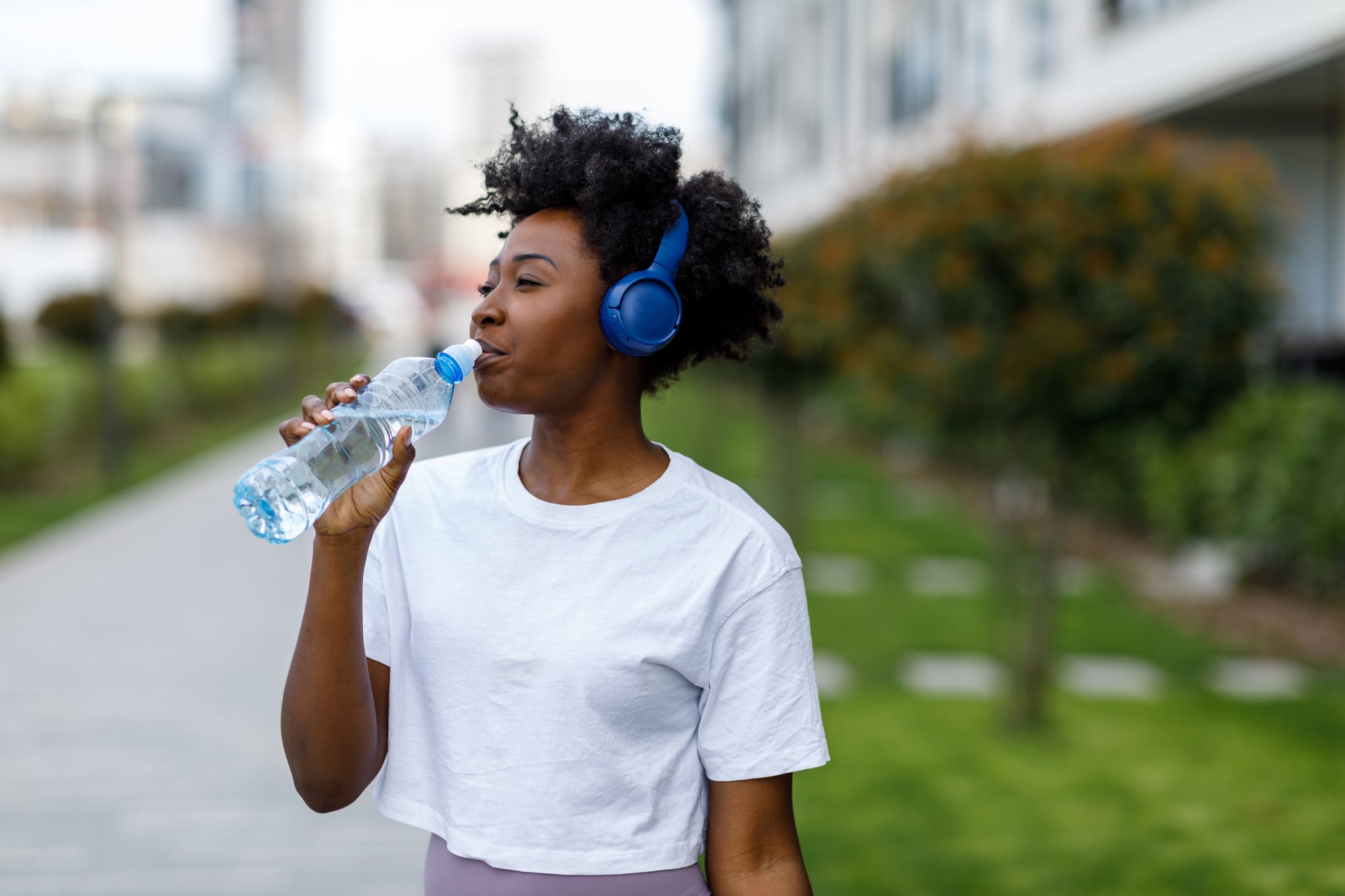 I’ve always considered myself sufficiently hydrated. Growing up, my dad constantly reminded me to drink water. Whether it was before a flight, sporting event, or hot beach day, I constantly heard the loving words “keep drinking!” and “drink up!” But exactly how much water should you be drinking?
I’ve always considered myself sufficiently hydrated. Growing up, my dad constantly reminded me to drink water. Whether it was before a flight, sporting event, or hot beach day, I constantly heard the loving words “keep drinking!” and “drink up!” But exactly how much water should you be drinking?
For years, we’ve heard mixed feedback on how many water bottles you need to drink a day, and more recently, we’ve seen reports about overhydration. But considering 75 percent of adult Americans are chronically dehydrated, sipping H2O is a non-negotiable that most of us could be better about. After all, there are some serious health benefits of drinking water.
To help clear the air, POPSUGAR talked with experts about exactly how much water you should drink a day, including factors that may require you to drink more or less. Cheers!
Benefits of Drinking Water
The primary benefit of drinking water is that it maintains bodily functions, says Kim Shapira, RD, a registered dietitian and founder of the Kim Shapira Method. “Water regulates your temperature, supports your skin health, lubricates your joints, and helps with digestion and energy,” she explains. It also facilitates nutrient absorption, helps maintain cellular structure, and flushes out toxins from every cell in the body, she adds.
On top of that, water is key for supporting proper organ function, says Alexandra Kharazi, MD, a board-certified cardiothoracic surgeon and author of “The Heart of Fear.” In fact, if you’re dehydrated, the lack of water can lead to kidney insufficiency and even kidney failure in extreme cases, she adds.
In the same vein, adequate fluids are crucial for cognitive functioning and brain health to support learning, thinking, reasoning, remembering, and problem solving, Dr. Kharazi says. That’s why if you don’t drink enough water, you may feel dizzy, lightheaded, confused, and/or tired.
Another perk? Water is necessary for maintaining proper digestion and optimal gut health, Dr. Kharazi says. Not only does it promote the absorption of nutrients and dissolution of your food, but it also facilitates waste removal through urination, perspiration, and bowel movements, adds Shapira.
How Much Water Should You Drink?
While there are general guidelines for how much water you should drink as an adult, your daily needs may change depending on a variety of factors.
How Much Water Should You Drink Daily?
A glass of water is generally considered eight ounces, and the official recommendation is to drink six to eight glasses of water per day (around 64 ounces), or just under two liters, says Dr. Kharazi.
That said, this is a general guideline and daily needs may vary depending on your body composition, activity level, and overall health (more on that soon!), notes Dr. Kharazi. Men may also require slightly more water than women, but everyone’s specific hydration needs vary, she explains. “There’s no one-size-fits-all approach.”
How Many Water Bottles Should You Drink a Day?
As for how many bottles of water you should drink, there isn’t a standard guideline since every bottle is different, says Shapira. Instead, your best bet is to aim for at least eight glasses or 64 ounces of water a day, she adds.
And yes, sparkling water does count toward your water goals, says Dr. Kharazi. Just be sure to check the label and avoid drinks with hidden calories, artificial sweeteners, and other derivatives, she explains. Too much sparkling water may also cause digestive upset and lead to burping or bloating, adds Shapira.
If you don’t like the taste of water, Dr. Kharazi recommends infusing your H2O with fruit such as lemons, limes, or oranges. Shapira also suggests leveling-up your hydration game and finding cute glasses, straws, or water bottles that motivate you to keep sipping.
What Impacts Your Water Goals?
People who rigorously exercise generally need more water than the standard 64-ounce recommendation, since they’re likely sweating and losing more fluids, says Shapira. If you exercise in extreme heat, make sure you’re especially cognizant of your water intake since there’s a higher susceptibility to dehydration in these environments, Dr. Kharazi adds.
Additionally, those who live in hot or dry climates require more water than those who live in cold, wet climates, since there’s an increased risk of dehydration, says Shapira. In fact, if you spend a lot of time outdoors and are active for more than two hours, you’ll need to drink more and may want to consider adding electrolytes to ensure the absorption of water, she explains.
If you’re pregnant or breastfeeding you’ll also have an increased need for water, says Shapira. Thanks to the plethora of changes a pregnant person’s body undergoes pre- and post-natal, extra water is needed due to increased blood volume, amniotic fluid, and fetal circulation, she explains. Water will also help prevent constipation and urinary tract infections, she adds.
Lastly, those with chronic health conditions should always talk with their doctor to understand their individual hydration needs, says Dr. Kharazi. In particular, people with congestive heart failure will have decreased fluid intake requirements due to the inability of the heart to handle the extra volume of water, she explains. “It’s a good idea to bring up your water intake at your next doctor’s appointment, and they can help guide you in the right direction.”
